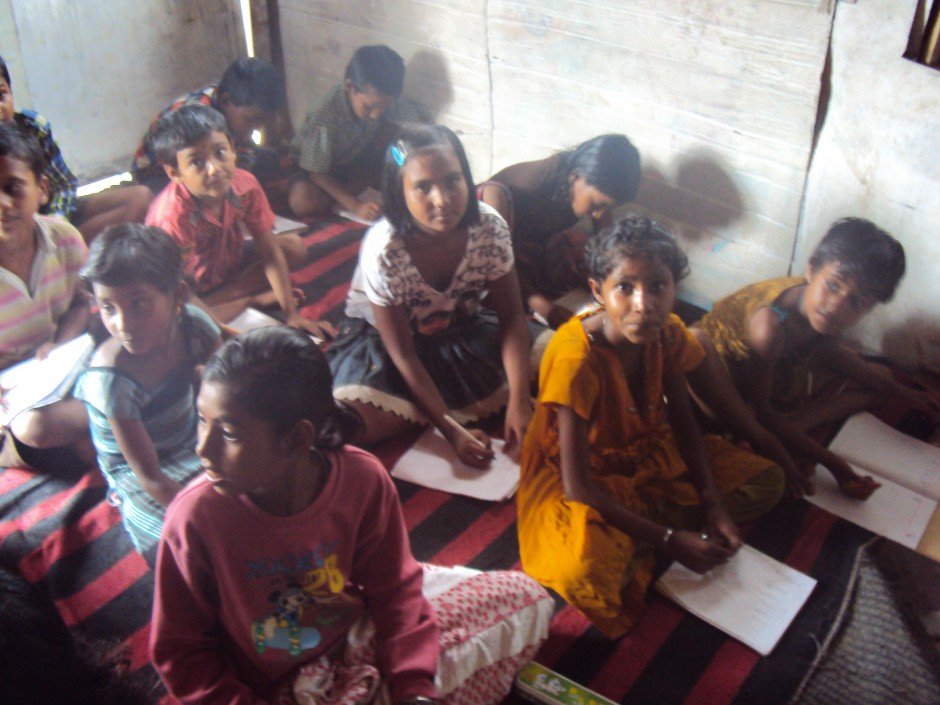Pilot Project and Propagation

IDS in collaboration with Indian Pollution Control Association (IPCA)* has setup two pilot schools to provide education for rag-picker children in two different location of Noida, Uttar Pradesh. One cluster is located at Village Barola, Sector-49, and the other at Village Sarfabad, Sector-73. Each cluster has 10–15 migrant families from West Bengal engaged in waste collection and sorting business with 25–30 children ranging in ages from 3–10 years. We see the potential in expanding this network to 700 rag pickers and their families in Delhi, Noida, and Gurgaon.
Life of Rag Pickers and Their Children

Most rag pickers are migrants from West Bengal, Assam, Eastern Uttar Pradesh, and Bihar and earn their livelihood by collecting waste material from different sources, which each family member does collectively, including children. Unfortunately, the children do not attend school; without education, the children remain in the lower strata of the society. Often, life for rag pickers is difficult, as one IPCA officer notes:
“Walking on the road, picking up waste, they are bullied to clean up private homes, beaten by municipal sweepers and police personnel and abused by the general public, even sexually assaulted. Most people see them as greedy thieves, not as disadvantaged and poor children struggling to survive.”
Educating Our Rag Picker Children
Education is a particular challenge. Even if the children join a government school, many drop out because government paid teachers discriminate against them. In a survey of our associated network of rag pickers in Delhi, Noida and Gurgaon, we found the rage pickers to be keenly interested in our program of primary education. IPCA envisage the following objectives through this program:
Primary
- Improve literacy (95%)
- Enroll children in government secondary schools (90%)
Secondary
- Reduction in disease incidence
- Reduction in acute malnutrition (as per WHO standards)
- Empowerment of clusters
Unit Cost and System Cost
The cost to set-up and run a school is approximately $2500 annually, reaching 25–30 children per school cluster. We envision expanding the network to 15 additional clusters.
*IPCA is a non-profit organization working for more than a decade on issues related to waste management. IPCA provides waste collection, separation, recycling and disposal services to different sectors of society, including residential, corporate, institutional, and industrial. IPCA organizes rag pickers to execute the services.
 IDS in collaboration with Indian Pollution Control Association (IPCA)* has setup two pilot schools to provide education for rag-picker children in two different location of Noida, Uttar Pradesh. One cluster is located at Village Barola, Sector-49, and the other at Village Sarfabad, Sector-73. Each cluster has 10–15 migrant families from West Bengal engaged in waste collection and sorting business with 25–30 children ranging in ages from 3–10 years. We see the potential in expanding this network to 700 rag pickers and their families in Delhi, Noida, and Gurgaon.
IDS in collaboration with Indian Pollution Control Association (IPCA)* has setup two pilot schools to provide education for rag-picker children in two different location of Noida, Uttar Pradesh. One cluster is located at Village Barola, Sector-49, and the other at Village Sarfabad, Sector-73. Each cluster has 10–15 migrant families from West Bengal engaged in waste collection and sorting business with 25–30 children ranging in ages from 3–10 years. We see the potential in expanding this network to 700 rag pickers and their families in Delhi, Noida, and Gurgaon.
 Most rag pickers are migrants from West Bengal, Assam, Eastern Uttar Pradesh, and Bihar and earn their livelihood by collecting waste material from different sources, which each family member does collectively, including children. Unfortunately, the children do not attend school; without education, the children remain in the lower strata of the society. Often, life for rag pickers is difficult, as one IPCA officer notes:
“Walking on the road, picking up waste, they are bullied to clean up private homes, beaten by municipal sweepers and police personnel and abused by the general public, even sexually assaulted. Most people see them as greedy thieves, not as disadvantaged and poor children struggling to survive.”
Educating Our Rag Picker Children
Education is a particular challenge. Even if the children join a government school, many drop out because government paid teachers discriminate against them. In a survey of our associated network of rag pickers in Delhi, Noida and Gurgaon, we found the rage pickers to be keenly interested in our program of primary education. IPCA envisage the following objectives through this program:
Most rag pickers are migrants from West Bengal, Assam, Eastern Uttar Pradesh, and Bihar and earn their livelihood by collecting waste material from different sources, which each family member does collectively, including children. Unfortunately, the children do not attend school; without education, the children remain in the lower strata of the society. Often, life for rag pickers is difficult, as one IPCA officer notes:
“Walking on the road, picking up waste, they are bullied to clean up private homes, beaten by municipal sweepers and police personnel and abused by the general public, even sexually assaulted. Most people see them as greedy thieves, not as disadvantaged and poor children struggling to survive.”
Educating Our Rag Picker Children
Education is a particular challenge. Even if the children join a government school, many drop out because government paid teachers discriminate against them. In a survey of our associated network of rag pickers in Delhi, Noida and Gurgaon, we found the rage pickers to be keenly interested in our program of primary education. IPCA envisage the following objectives through this program:




